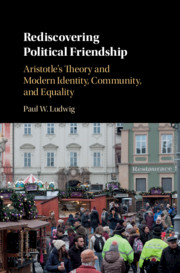Crossref Citations
This Book has been
cited by the following publications. This list is generated based on data provided by Crossref.
Carrese, Paul
2023.
Civic Preparation of American Youth: Reflective Patriotism and Our Constitutional Democracy.
The ANNALS of the American Academy of Political and Social Science,
Vol. 705,
Issue. 1,
p.
39.
Hepçağlayan, Cansu
2023.
Reasons for Political Friendship.
Ethical Theory and Moral Practice,
Vol. 26,
Issue. 3,
p.
343.
Polansky, David
2023.
Populism and Democratic Conflict: An Aristotelian View.
The Review of Politics,
Vol. 85,
Issue. 2,
p.
207.
Classen, Albrecht
2024.
Moral Psychology in History: From the Ancient to Early Modern Period.
Vol. 79,
Issue. ,
p.
293.
Hepçağlayan, Cansu
2024.
Political friendship as joint commitment: Aristotle on
homonoia
.
Inquiry,
p.
1.
Kim, Juman
2024.
Tempering senses of superiority: The virtue of magnanimity in democracies.
American Journal of Political Science,
Vergaray, Alfonso R.
2024.
Navigating Democracy’s Fragile Boundary: Lessons from Plato on Political Leadership.
Philosophies,
Vol. 9,
Issue. 2,
p.
49.
Duff, Alexander S.
2025.
Anger, Hatred, and Judgment in Aristotle's Rhetoric.
American Journal of Political Science,
Vol. 69,
Issue. 1,
p.
240.



